Sample Puppy Schedule 8 Weeks – Do you have a new puppy that’s only 8 weeks old? You must be so excited! But taking care of a little puppy can be a big job. You must know when to feed them when to take them outside, and even when to play and sleep. But don’t worry! We’ve made a whole schedule just for you and your puppy. This guide will help you know what to do and when. It will make you and your puppy very happy. Let’s find out what you and your puppy can do together!.
Puppy schedule 8 weeks Feeding
Frequency
An 8-week-old puppy is growing fast and needs proper nourishment. Feeding should occur at regular intervals, three times a day:
- Breakfast: Around 7 am
- Lunch: Around 12 pm
- Dinner: Around 5 pm
Suggested Food Types
Here’s a detailed list:
Dry Puppy Kibble:
- Protein-rich: Look for kibble with real meat as the first ingredient.
- Size-appropriate: Choose kibble that’s small enough for your puppy to chew.
- Brand quality: Consult with a vet for trusted brands.
Wet Canned Food:
- Mix with Dry Food: Wet food adds water and can be combined with dry kibble.
- Rich in Nutrients: Look for varieties specially made for puppies.
Fresh Meat and Vegetables:
- Supervised by a Vet: Always consult a vet before introducing fresh food.
- Cooked Properly: Make sure meats are cooked well and avoid spices.
Water Access:
- Fresh Water: Always provide fresh water.
- Clean Bowls: Make sure to clean the water bowl regularly.
Portion Control
Knowing portion to provide your puppy is essential:
- Follow Packaging Instructions: Food packaging usually suggests portion sizes based on weight.
- Consult a Vet: A vet can provide a personalized feeding plan.
Transitioning Foods
If you need to change your puppy’s food:
- Do It Gradually: Combine the old food with the new and gradually increase the new food’s portion over a week.
- Watch for Reactions: Monitor your puppy for any signs of digestive discomfort.
Treats and Supplements
Treats are fun, but:
- Use Sparingly: Treats should not exceed 10% of the puppy’s daily calories.
- Choose Healthy Options: Look for treats created especially for puppies.
Supplements are usually optional if you are providing high-quality retail puppy chow. If considering supplements, consult with a vet first.
Feeding an 8-week-old puppy requires attention to timing, food types, portion control, and possible transitions.
Puppy schedule 8 weeks Potty Training
Timing
When should you take your puppy outside? Here’s when:
- After Eating: In 15-30 minutes after food time.
- After Playing: After fun playtime.
- After Waking Up: When your puppy wakes up.
- Before Bedtime: The last time before going to bed. Do the same thing every day, and your puppy will learn fast!
Tips and Tricks
- Same Spot: Always go to the same place. Your puppy will know what to do.
- Use a Leash: This helps your puppy know it’s potty time.
- Say a Good Job: Say “good job” and give a treat when your puppy goes potty outside.
- Use Easy Words: Say something like “Go Potty” every time.
- No Yelling: If a mistake happens, it’s okay. Just clean it up.
- Make a Plan: Write down when your puppy eats and goes potty.
What to Do if It’s Raining?
Is it raining or snowing? You can:
- Use Puppy Pads: These are for inside.
- Find a Covered Spot: This is outside but has a roof.
Problems and What to Do
- Problem: Puppy won’t go outside. What to Do: Wait and keep trying.
- Problem: Oops! The puppy went potty inside. What to Do: Keep trying and say “good job” when it happens outside.
Potty training is like a game. It takes time, but it’s fun. Your puppy will learn how to go potty outside. Just keep trying and say, “good job!”
Sleep Schedule
Nap Times
Puppies love to sleep; at 8 weeks old, they need much rest to grow healthy and strong. Here’s a guide to nap times:
- After Playtime: Playing is hard work! A short nap helps the puppy recharge.
- After Meals: A little rest aids digestion.
- Throughout the Day: Puppies might sleep 18-20 hours daily, so expect many short naps.
Here’s how to encourage nap times:
- Create a Cozy Spot: A soft bed or blanket in a quiet place helps the puppy relax.
- Keep a Routine: Like potty training, a sleep routine helps the puppy know what to expect.
Night Sleep
Nighttime sleep is crucial for the puppy and the rest of the household. Here’s how to encourage a full night’s sleep:
- Bedtime Routine: Develop a routine that signals bedtime, like a calm cuddle or a soft word.
- Own Sleeping Area: A crate or a specific bed for the puppy creates a secure sleeping environment.
- Last Potty Trip: Remember the last potty trip right before bed!
- Comfort Items: A favorite toy or a piece of clothing with your scent can make the puppy feel safe.
- Avoid Feeding Right Before Bed: This prevents the need for potty breaks during the night.
Dealing with Night Crying
It’s normal for puppies to cry during the night at first. Here’s how to handle it:
- Stay Calm: It’s tough, but stay patient and calm.
- Don’t Encourage It: If the puppy learns that crying brings attention, it might continue.
- Check for Needs: Ensure the puppy doesn’t need food or a potty break.
- Comfort Techniques: Soft music or a gentle pat might soothe the puppy back to sleep.
Establishing a sleep schedule for your 8-week-old puppy ensures that the puppy and the family have peaceful nights and restful days. Consistent nap times, bedtime routines, patience, and understanding make this adjustment period smooth and enjoyable.
Puppy schedule 8 weeks Play and Socialization
Playtime
Here’s a guide to playtime:
- Morning and Evening: These are often the most active times for a puppy.
- After Meals and Naps: Short play sessions are great during these times.
Here’s how to make playtime effective and enjoyable:
- Use Appropriate Toys: Softballs, squeaky, and chew toys are fun and safe.
- Supervised Play: Always supervise playtime to ensure safety.
- Teach Gentle Play: Encourage gentle play and discourage biting or rough play.
Socializing with Other Dogs and People
- Introduce Slowly: Start with calm, well-behaved dogs and people.
- Use Controlled Environments: A quiet park or a friend’s house can be ideal.
- Monitor Interactions: Always watch the puppy to ensure positive experiences.
- Use Treats and Praise: Reward good behavior to reinforce positive socializing.
- Attend Puppy Classes: These can be a great way to meet other puppies and learn from experts.
Exploration and New Experiences
Introducing a puppy to new sights, sounds, and smells is also part of socialization:
- New Places: Take the puppy to safe areas like parks, gardens, and pet stores.
- Different People: Let the puppy meet people of different ages and appearances.
- Various Sounds: Gentle exposure to different sounds like traffic, music, or vacuum cleaners helps the puppy adapt.
Avoiding Over stimulation
Puppies can get overwhelmed, so here’s how to avoid that:
- Watch for Signs: If the puppy seems scared or tired, it’s time for a break.
- Keep Sessions Short: Short, positive experiences are more beneficial.
- Stay Calm and Positive: Your mood affects the puppy, so stay calm and happy.
Puppy schedule 8 weeks Training and Discipline
Teaching Easy Commands
Want to teach your puppy? Here’s how:
- Start Easy: Use words like “Sit” and “Stay.”
- Give Treats: Treats and saying “good job” make learning fun.
- Keep It Short: 5-10 minutes is enough.
- Do the Same Thing: Use the same words every time.
Box Training
A special box can be a safe place for your puppy:
- Pick the Right Box: Big enough to stand and lie down.
- Make It Cozy: Put in a soft blanket and toys.
- Show the Box: Let the puppy see it first.
- Use for Naps: It’s a nice place to sleep.
Leash Training
Leash training helps your puppy walk nicely:
- Pick a Small Leash: Light and easy for little puppies.
- Show the Leash: Let the puppy wear it at home first.
- Practice Inside: Walk inside the house first.
- Make It Fun: Treats and saying “good job” make it nice.
Teaching Good Choices
Teaching good choices doesn’t mean being mean:
- Show a Toy: If chewing something bad, give a toy.
- Say “No”: Say “No” if something is wrong.
- No Hitting: Hitting can make the puppy scared.
- Say “Good Job”: Always say this when the puppy does right.
Getting Help from a Trainer
Sometimes, you might need a trainer’s help:
- Puppy Classes: These are good for learning easy things.
- A Trainer Just for You: If there’s a big problem, a trainer can help just you.
Training a puppy is like playing a game. It’s fun and helps your puppy learn good ways to act. If you keep trying and say “good job,” your puppy will learn fast.
Health and Grooming Puppy schedule 8 weeks
Regular Check-Ups
Your puppy’s health is a priority. Regular check-ups help keep them healthy:
- First Vet Visit: Schedule a visit soon after bringing the puppy home.
- Vaccinations: Discuss a vaccination schedule with your vet.
- Parasite Control: Regular checks for fleas, ticks, and worms.
Feeding
Proper nutrition is key:
- Choose the Right Puppy Food: Consult your vet for recommendations.
- Follow Feeding Guidelines: Puppies need to be fed multiple times a day.
- Monitor Weight and Growth: Keep an eye on your puppy’s development.
Dental Care
Good dental hygiene starts young:
- Use Puppy Dental Products: Special toothbrushes and toothpaste for puppies.
- Start Slow: Introduce dental care gradually.
- Chew Toys: These can help with dental health.
Bathing and Grooming
Keeping your puppy clean and well-groomed is essential:
- Bathing: Use puppy-friendly shampoo, and don’t bathe too frequently.
- Brushing: Regular brushing helps keep the coat healthy.
- Nail Trimming: Start slowly, and use tools designed for puppies.
- Ear Cleaning: Check ears regularly and clean them as directed by your vet.
Socialization and Mental Health
A happy puppy is a healthy puppy:
- Provide Social Interaction: Play dates and training classes are great.
- Offer Mental Stimulation: Toys, puzzles, and playtime keep the mind active.
- Provide a Safe Environment: Ensure a safe and comfortable living space.
Spaying/Neutering
Discuss with your vet the best time for spaying/neutering, as it varies by breed and individual needs.
Emergency Care
Know your vet’s emergency procedures, and prepare an emergency care kit.
From regular veterinary care and proper feeding to grooming and mental well-being, every element plays a role in the puppy’s overall health and happiness.
This comprehensive guide ensures your puppy will grow and thrive lovingly and responsibly.
Puppy schedule 8 weeks Challenges and Solutions
Here are common obstacles and practical solutions:
Potty Training Difficulties
- Challenge: Accidents in the house.
- Solution: Keep a consistent schedule and use positive reinforcement. Patience is key.
Chewing and Biting
- Challenge: Puppies love to chew on everything, including hands!
- Solution: Redirect to appropriate chew toys, and teach “gentle mouth” commands.
Separation Anxiety
- Challenge: Crying and distress when left alone.
- Solution: Gradually increase alone time, and create a comforting environment with familiar items.
Sleep Disruptions
- Challenge: Night waking and crying.
- Solution: Keep a consistent bedtime routine and be patient during adjustment.
Leash Pulling
- Challenge: Pulling on the leash during walks.
- Solution: Use proper training techniques and possibly a puppy-appropriate harness.
Fussy Eating
- Challenge: Picky eating or eating too quickly.
- Solution: Choose quality puppy food, and consult your vet if the problem persists.
Socialization Challenges
- Challenge: Fear or aggression towards other animals or people.
- Solution: Gradual exposure to new experiences, positive reinforcement, and professional help if needed.
Health Concerns
- Challenge: Unexpected health issues.
- Solution: Regular veterinary care, proper feeding, and grooming can prevent many problems.
Raising a puppy as young as 8 weeks can bring joy and unexpected challenges.
Sample Puppy Schedule 8 Weeks
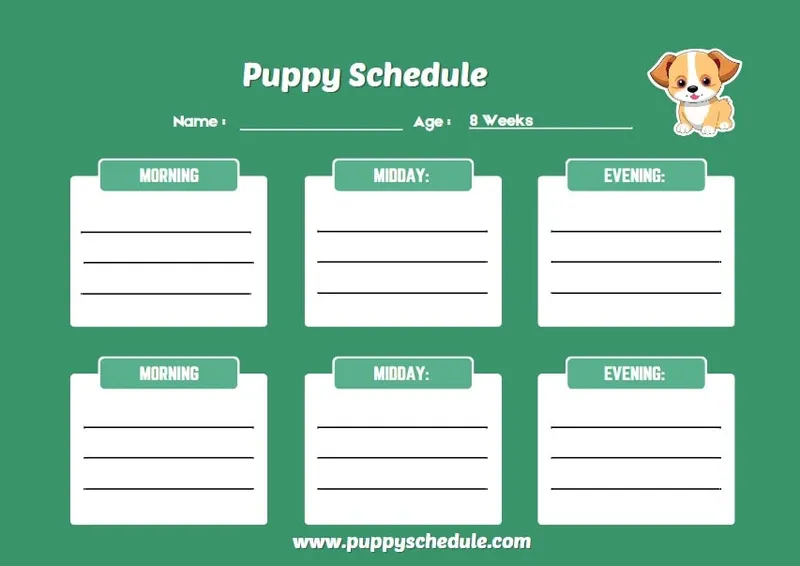
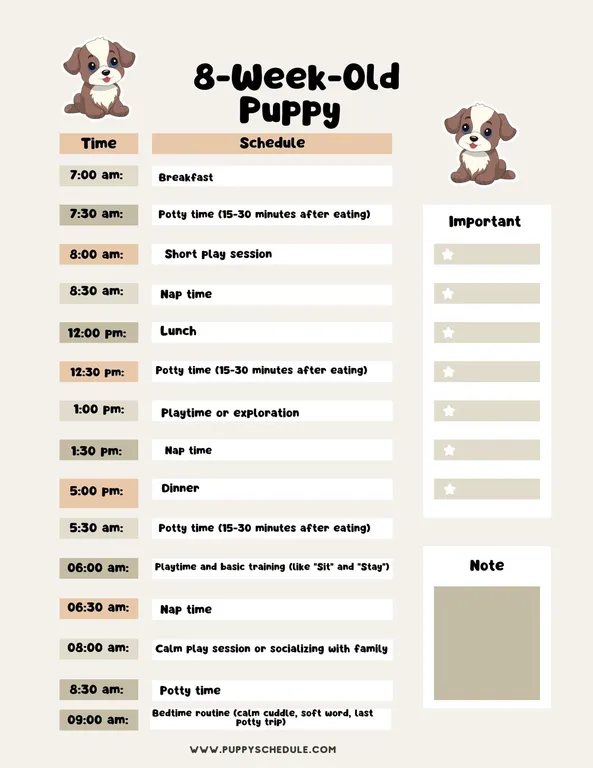
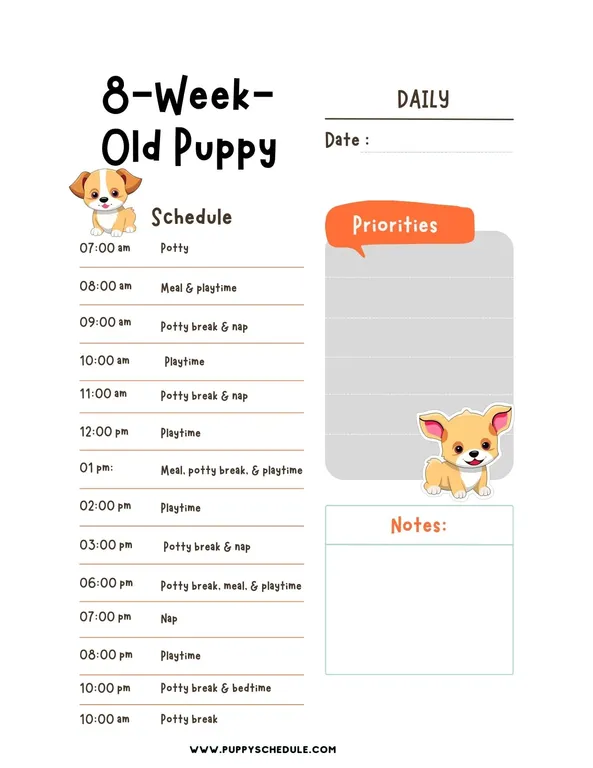
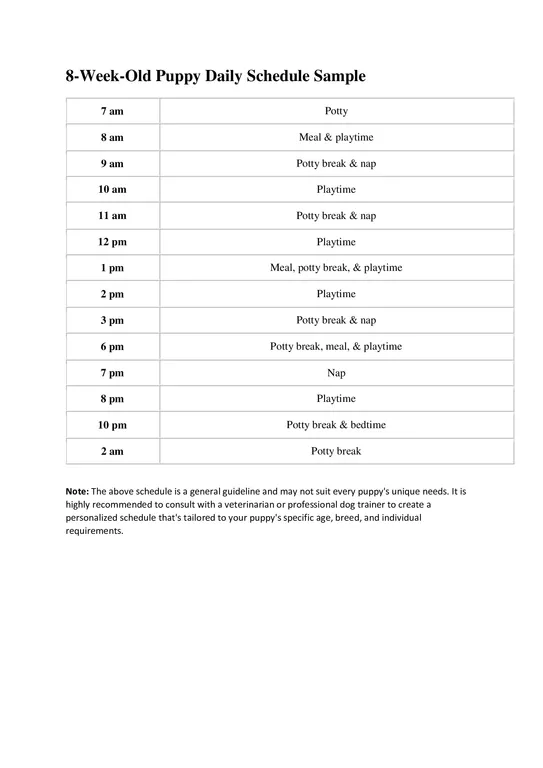
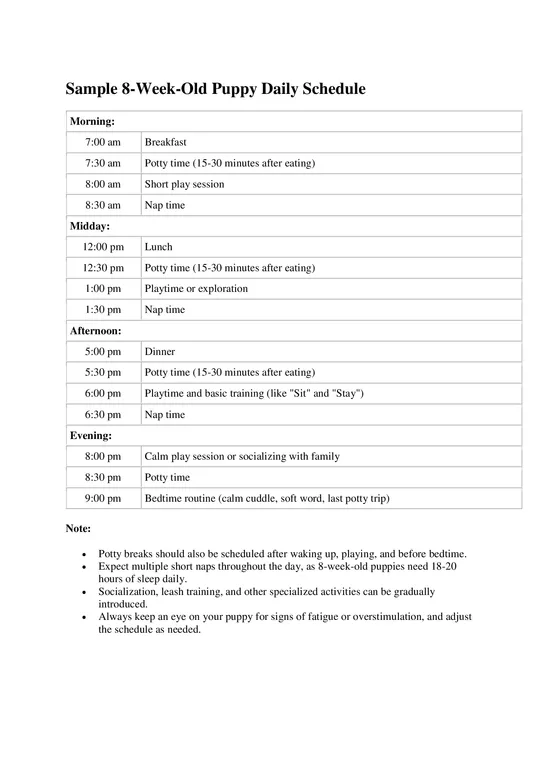
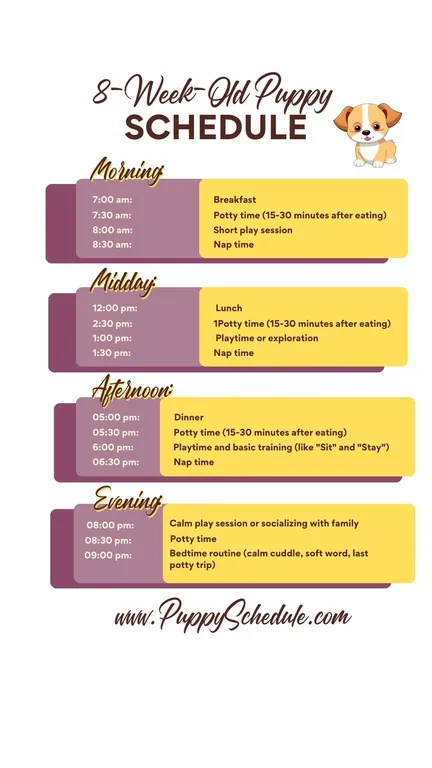
Conclusion
Raising a puppy as young as 8 weeks can bring joy and unexpected challenges.You’ve learned a lot about taking care of your puppy schedule 8 weeks. It’s like a big, fun game but needs patience and love. With this guide, you now know how to feed, train, play with, and even tuck in your puppy for the night. Remember, sometimes problems might happen, and that’s okay. You’ve got the solutions right here! Keep trying, say “good job” to your puppy, and you will soon be best friends. Happy puppy raising!


